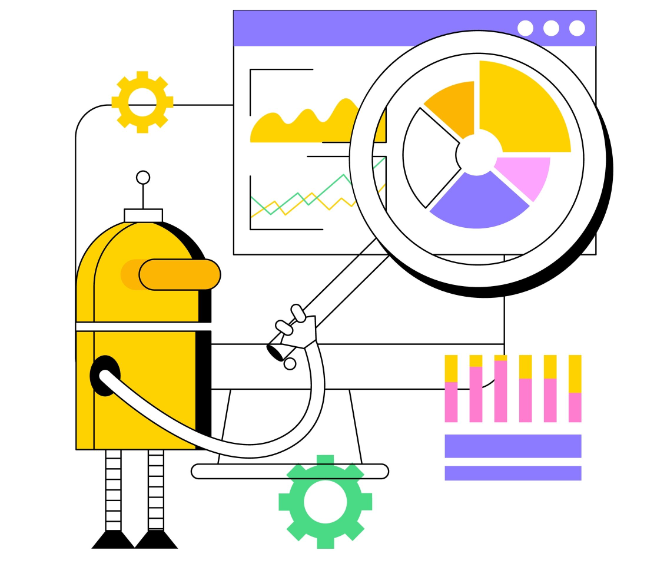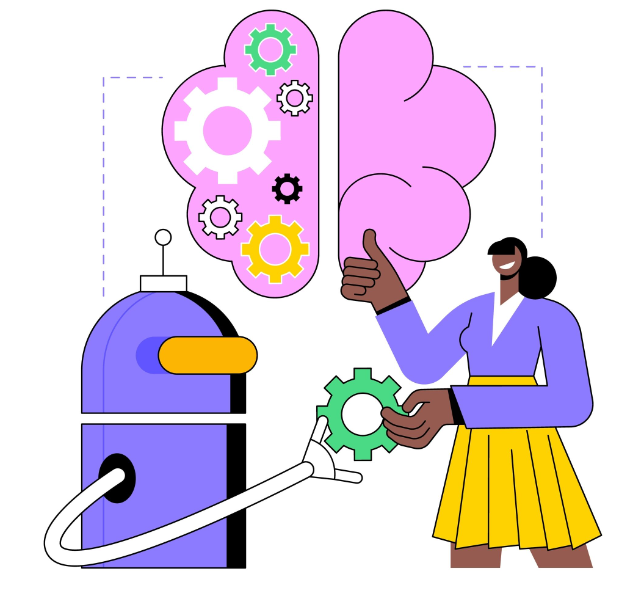How is AI content changing digital marketing?
Artificial Intelligence, or AI for short, is changing how things are done in almost every industry.
Using AI SEO tools to help create content is a no-brainer for digital marketers.
Here’s why.

What is AI content marketing?
There are three main steps in the content creation process:
- Research
- Writing
- Optimising
When given a prompt, AI-powered tools can carry out various tasks associated with each step. Better yet, the more an AI tool is used, the more it adapts, becoming better at the jobs you use it for.
What AI means for SEO content writers
While many parts of search engine optimisation can be automated for greater accuracy and speed, your content marketing strategy is the prominent place to start.
Because Google’s search engine algorithm is increasingly geared towards answering users’ queries, SEOs increasingly value content creation that provides in-depth and accurate answers.
AI enables writers to produce better-researched and more optimised high-quality content faster.
So, why wouldn’t we take advantage of this?
Does AI content rank in Google?
While AI technology can undoubtedly boost the efforts of your SEO strategy (and make life much easier), you can’t rely entirely on it if you want to rank well in search results.
Information spat out by AI is sourced from existing content on the web. Still, Google’s search quality guidelines stress the importance of experience, expertise, authoritativeness, and trustworthiness in content (E-E-A-T principles), so regurgitating existing opinions isn’t good enough. Content must bring new information and perspectives.
For SEO content writers, this means you’ll still have a job (hooray!), but you’ll also need to use your brain to ensure your AI-generated content is human enough to perform well in search engines and add value to a searcher’s journey.

How to implement AI in SEO content writing
Here’s how you can use various AI tools to automate repetitive tasks while producing high-quality content that search engines love.
1. Research and ideation
Before putting pen to paper, you need to know what the hell you’re talking about.
With Google’s preference for helpful content, the research and ideation stage can be tedious and time-consuming, with human writers wasting hours trying to wrap their heads around how they’ll expertly explain topics like “How to choose the right Superannuation fund.”
This is where AI is your best friend.
In a recent survey from HubSpot, almost half (48%) of the marketers surveyed said they use generative AI to conduct research and 22% use AI to generate ideas.

ChatGPT prompt examples
To get the ball rolling, try asking your own version of the following:
- “Explain salary sacrificing in simple terms.”
- “Summarise the following article into a one-paragraph conclusion.”
- “Generate 10 alternative titles for this blog heading.“
- “Write short marketing taglines for electric vehicles in an inclusive TOV.”
- “Create a product page that highlights the benefits of novated leasing.”
Remember: The answers provided by AI algorithms are only as good as the prompt given so be as descriptive as you can and iterate the prompt based on initial answers.

2. Writing
As mentioned before, helpful content that’s written for humans and expresses an opinion ranks higher in Google search results.
With artificial intelligence covering the basics, writers could have more time to add their personal touch.

Can ChatGPT actually write SEO content?
Sort of. While machine learning and natural language processing (NLP) has come a long way, ChatGPT isn’t quite at the stage where it can produce a perfect article.
However, it can generate a basic first draft that may contain some detailed insights that make it to the final version.
Depending on the type of content you’re producing, there are plenty of other AI tools that could potentially do a better job.
For example, Jasper is praised for its Workflows that can create a product or blog page draft in minutes, Bramework is a hit with bloggers writing long-form content and StoryChief is a go-to for social media posts.
How to use ChatGPT for marketing copy
If you will use ChatGPT to create content, I’d recommend using it as a jumping-off point before switching to different AI tools.
Priming ChatGPT with some context beforehand can provide you with more tailored information, and it’ll remember it for next time too.

3. Optimisation
Whatever AI tool you used to produce your first draft, it probably won’t be optimised for SEO as well as it could be. Luckily, using AI for content optimisation is really where the magic happens.
AI takes the guesswork out of optimising content and gives you all the insight you need to boost your website’s search rankings in ways humans could never do before.

How AI can help optimise content for search engines
- On-Page SEO recommendations: SEO tools like SurferSEO can instantly analyse an entire page and provide word count, heading, title, phrasing, and entity suggestions based on top-ranking competitors.
- Readability: For guaranteed high-quality content, Atomic Reach and Grammarly go beyond fixing typos to identifying and recommending solutions for sentences that sound longwinded, off-brand, repetitive or just plain boring.
- Internal linking: Solutions like Market Brew use artificial intelligence to show you how, when, and where you should be linking to your existing pages.
- Distribution: CopyAI can create content tailored for specific social platforms and even take care of your EDM campaigns.
- Uniqueness: Semrush’s Rephraser tool can analyse content for plagiarism or duplication and provide users with rephrasing suggestions in real-time.
- Target audience: With Anyword‘s customer persona feature, you can add in the age, gender and pain points of your target audience to produce more personalised content with greater user intent.
- Meta descriptions: Whether for a landing page or blog post, Jasper can whip up enticing, SEO-friendly meta descriptions and title tags in just a few clicks.
- Voice search optimisation: With recent changes in user behaviour, many SEO strategies now focus on optimising search results delivered by voice assistants. AI tools like Hypotenuse AI allow you to input specific keywords, making it a breeze to generate content that targets voice search user queries.

Conclusion
AI-powered tools are rapidly transforming content marketing campaigns.
Leveraging artificial intelligence not only helps businesses generate content more quickly, but it can provide the actionable insights necessary to achieve better-optimised content and greater customer satisfaction.
However, like all emerging technologies – AI is not a magic bullet. Solely relying on AI for your content strategy can easily backfire, particularly as search engines favour unique, engaging content.
At least for now, human creativity remains an essential ingredient for producing high-quality content, with AI stepping in as a powerful ally.
By striking the right balance in your SEO strategy, AI can help you stay ahead of the curve and drive impressive results.
Written by
Tahlia Reynolds





